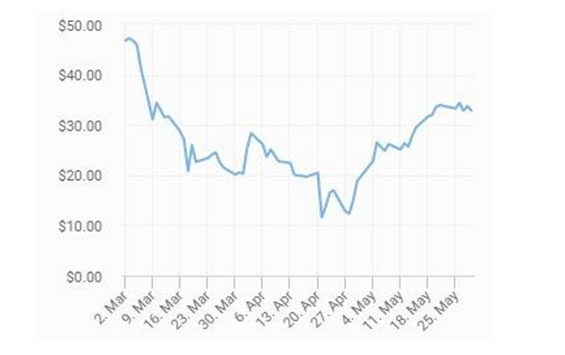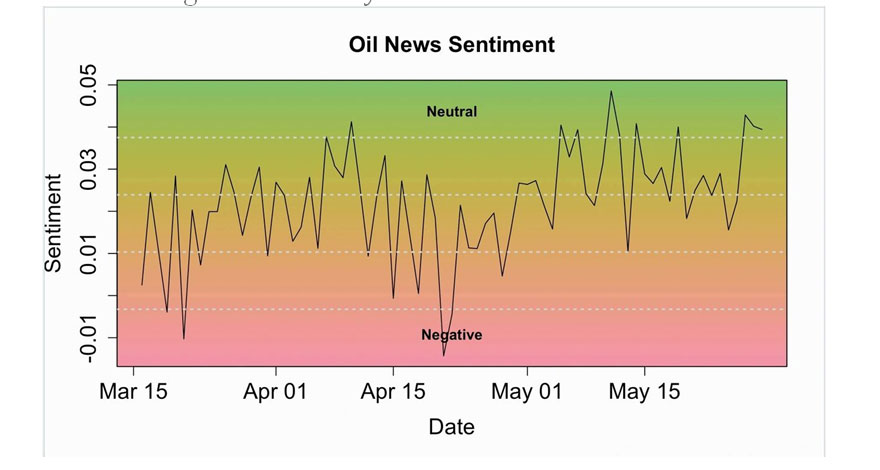Oil News Sentiment Captures the Firmness in Crude Prices, Is the worst over for Oil?
The last couple of weeks have been good for crude prices. Around middle of May, WTI Crude prices started to break out from a USD 25 per barrel price range to a higher range. But first, the prices were forming a base at that level. For the last ten days and more, the prices have been consistently above 30 dollars and they are fairly stable. While upward price movement is important, we think a fairly consistent and narrow range is equally relevant.
Fig. 1: WTI Crude Price over last three months

Now comes the more interesting part. The next chart shows the EMAlpha Oil News Sentiment. While the Sentiment is volatile and it should be because it is based on multiple unstructured and varying data points, the Sentiment is clearly showing a significant improvement in last fifteen days. As such the average EMAlpha Oil News Sentiment in May is much more positive than either March or April. In last two weeks, the volatility also has been on the lower side.
Fig. 2: EMAlpha Oil News Sentiment

This implies that the news Sentiment is doing a good job in making the price forecast. As we had highlighted in our insight on May 14, 2020, the Oil Sentiment was having its ‘break out’ moment around 10th of May and this change in oil news sentiment indicated that we are past the worst of Coronavirus crisis and things will get better from now on. This is how exactly it has turned out. On the basis of oil news sentiment, it is unlikely that Oil is going below 30 dollars in near term. But we will keep a watch.
Research Team
EM Alpha LLC
For more EMAlphainsights on Emerging Markets, please visit https://emalpha.com/insights/. To know how you can use EMAlpha’s unstructured data on Emerging Markets for better investment decisions, please send us an email at [email protected].
About EMAlpha:
EMAlpha, a data analytics and investment management firm focused on making Emerging Markets (EMs) accessible to global investors and unlocking EM investing using machines. EMAlpha’s focus is on Unstructured Data as the EMs are particularly susceptible to swings in news flow driven investor sentiment. We use thoroughly researched machine learning tools to track evolving sentiment specifically towards EMs and EMAlpha pays special attention to the timely measurement of news sentiment for investors as these markets can be finicky and sentiment can be capricious.Our team members have deep expertise in research and trading in multiple Emerging Markets and EMAlpha’s collaborative approach to combining machine learning tools with a fundamental approach help us understand these markets better.
Disclaimer:
This insight article is provided for informational purposes only. The information included in this article should not be used as the sole basis for making a decision as to whether or not to invest in any particular security. In making an investment decision, you must rely on your own examination of the securities and the terms of the offering. You should not construe the contents of these materials as legal, tax, investment or other advice, or a recommendation to purchase or sell any particular security. The information included in this article is based upon information reasonably available to EMAlpha as of the date noted herein. Furthermore, the information included in this site has been obtained from sources that EMAlpha believes to be reliable; however, these sources cannot be guaranteed as to their accuracy or completeness. Information contained in this insight article does not purport to be complete, nor does EMAlpha undertake any duty to update the information set forth herein. No representation, warranty or undertaking, express or implied, is given as to the accuracy or completeness of the information contained herein, by EMAlpha, its members, partners or employees, and no liability is accepted by such persons for the accuracy or completeness of any such information. This article contains certain “forward-looking statements,” which may be identified by the use of such words as “believe,” “expect,” “anticipate,” “should,” “planned,” “estimated,” “potential,” “outlook,” “forecast,” “plan” and other similar terms. Examples of forward-looking statements include, but are not limited to, estimates with respect to financial condition, results of operations, and success or lack of success of certain investment strategy. All are subject to various factors, including, but not limited to, general and local economic conditions, changing levels of competition within certain industries and markets, changes in interest rates, changes in legislation or regulation, and other economic, competitive, governmental, regulatory and technological factors affecting the operations of the companies identified herein, any or all of which could cause actual results to differ materially from projected results.



